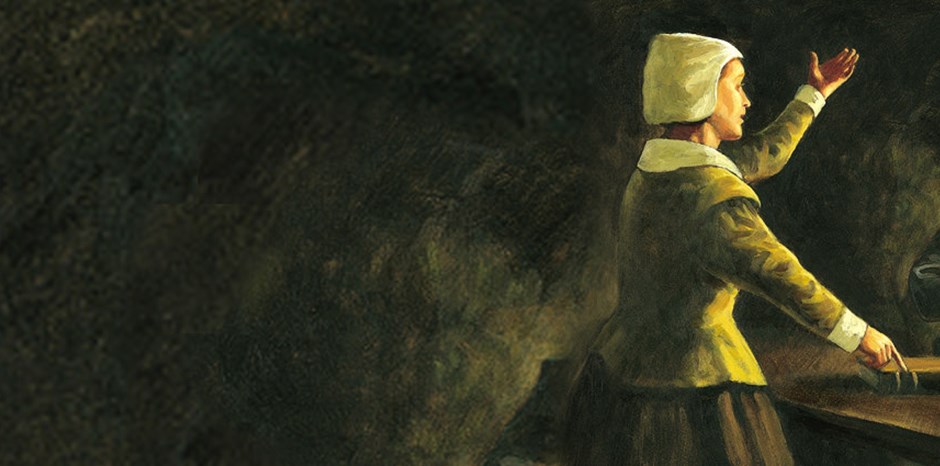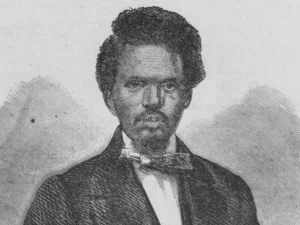For centuries women have fought against numerous injustices forced upon them because of their gender. Some of these injustices include the right to be seen as an equal to men, the right to vote, and the right for equal pay, along with many more. Although women have succeeded in breaking down some of these barriers, there are still many inequalities being fought today. During the seventeenth century, there was one woman in particular who battled in opposition to social injustice: Anne Hutchinson. This article is about the life of a brave woman who opposed an unfair law forbidding men and women from freely practicing their religion, and who also challenged the preposterous roles women were limited to in the religious community.

Anne Hutchinson, maiden name Anne Marbury, was born July 20, 1591, in Alford, England. She was the daughter of a midwife and a Cambridge scholar who published many unorthodox religious texts. In fact, Francis Marbury’s teachings were banned from where he was a teacher, at Saint Wilfred’s School in Alford. After vigorous pleading, Marbury was able to have the ban lifted, and he began teaching again in 1602. 1 Perhaps this is where Anne inherited her tenacious spirit to express her opinion. In 1605, at the young age of fourteen, Anne and her family moved to London for her father’s new position as rector of Saint Martin’s Vintry, leaving behind Anne’s boyfriend, a tailor named William Hutchinson. After the death of Anne’s father in 1611, Hutchinson moved to London to be with Anne; the next year the two were married. That same year, the newlywed bride returned to Alford where her husband continued his tailor business, and Anne followed in her mother’s footsteps as a midwife. Anne and William went on to raise thirteen children together in Alford. 2
In 1612, newly ordained Puritan minister John Cotton began preaching at Saint Botolph’s Church in Boston, Lincolnshire, not far from Alford where Anne Hutchinson resided. His unique approach greatly intrigued Hutchinson. 3 Cotton’s preaching and his understandings of religion reminded Anne of her father’s teachings. Anne enjoyed Cotton’s work so much, that in 1633, when Cotton immigrated to New England, Anne convinced her husband to move there as well. In 1634, Anne and her family made the long transition to Massachusetts. 4
The following year, in 1635, Hutchinson began holding weekly gatherings in her home to discuss minister Cotton’s sermons. Anne and her followers addressed their beliefs of sheer grace as opposed to the Calvinist theological viewpoint of predestination. Hutchinson and her followers believed that God alone grants salvation to whomever He believes is worthy of His grace, without human interaction. The clergy in New England taught that people could gain God’s grace by willingly performing various covenant conditions, such as performing good deeds, reciting prayers, attending church, along with other forms of religious practice. 5 Anne’s critics called her teachings Antinomianism. The Greek word is translated as “hostile to the law.” Anne provoked the colony leaders by proclaiming that members of their clergy who had not undergone a conversion experience had no authority to be held responsible for the spiritual offices of the colony. She also brought attention to the common yet unfair assumptions of women’s roles within Puritan society. 6 Anne’s following continued to grow, and it became so significant that in the 1636 governor’s election, the colony prevented the reelection of the current governor John Winthrop, and elected Sir Henry Vane the Younger into office. Sir Henry was an outspoken supporter of Anne’s movement, and he was a strong supporter of the anti-Winthrop movement.

Anne’s rising popularity caused three major problems for the colonial leaders. First, Anne’s gatherings paralleled preaching, which was strictly limited to those with a licence, and was absolutely forbidden to women. Second, the New England clergy was putting forth great effort in order to establish a unified church. Anne’s teachings contradicted their efforts. Third, Anne’s supporters consisted of both men and women. This act challenged the status quo of men being the only influential figures within society. 7 Never before had a woman caused so much trouble for authority figures, nor had a woman been the leader of a huge support of individuals.
The turning point of Anne’s momentum occurred during the governor election in May 1637, when former governor John Winthrop was reelected to office. It is not difficult to understand why Winthrop put Hutchinson on trial for heresy when he took office in November. 8 Winthrop was desperate to regain social order within the colony. The trial was held publicly to make an example out of Hutchinson, to show what happens to those who oppose the church and therefore oppose the colonial leadership. Anne surprised many with her witty banter and intellectual remarks. She defended herself quite impressively, proving her knowledge of the Bible and religious laws, and also by providing evidence demonstrating that her accused charge was based on more circumstantial evidence than proven facts of illegal activity. For example, the court tried to charge her with sedition, or an action suggesting discontent or rebellious actions against the government. Hutchinson made it clear that expressing opinions and holding conversations within a women’s meeting was not an illegal act. The statements made within those meetings were confidential because they were held in the privacy of her home. The spectacle of a self-educated woman verbally battling a governor who was a Cambridge scholar on an equal level was unheard of. Despite Hutchinson’s efforts, she was still convicted and banished from the colony. Anne was at a disadvantage from the start with civil officers, elected deputies, and clergymen represented as the jury in the trial. 9 After the verdict, Anne, her family, and a few loyal followers migrated to Rhode Island for a short while before settling in the Dutch colony of New Netherlands, which subsequently became New York. In 1643, Anne and her family became victims of an Indian uprising and were killed during the attack.

Anne Hutchinson is seen as one of the first female feminist who fought for religious freedom. Anne’s actions represent a right established to us as Americans in 1791. The first amendment to the Constitution established the freedoms of religion, assembly, speech, press, and petition. Anne’s reasons for refusing to conform to colonial authorities were reasonable and respectable. She was not the only person to fight for individual freedoms; but her courageous start led the way for others to fight against injustices too.
- John R. Holmes, “Anne Hutchinson,” Salem Press Biographical Encyclopedia (January 2016), 1. ↵
- Holmes, “Anne Hutchinson,” 1. ↵
- Francis J. Bremer, “John Cotton,” Salem Press Biographical Encyclopedia (2016), 1. ↵
- Holmes, “Anne Hutchinson,” 1. ↵
- James F. Cooper, Jr., “Anne Hutchinson and the ‘Lay Rebellion’ against the Clergy,” The New England Quarterly, Inc 61, no. 3 (September 1988): 382-383. ↵
- Alan Brinkley, American History, 15th ed., vol. 1: to 1865 (2 Penn Plaza, New York, NY 10121: McGraw Hill Education, 2015), 45. ↵
- Holmes, “Anne Hutchinson,” 1. ↵
- Alan Brinkley, American History, 45. ↵
- Lisa McGunigal, “The Criminal Trial of Anne Hutchinson: Ritual, Religion, and Law,” Mosaic: A Journal for the Interdisciplinary Study of Literature 49, no. 2 (June 2016): 1-8. ↵



133 comments
Daniela Iniguez-Jaco
The way the article started off was amazing! Prior to reading the article I had known little to nothing about Anne Hutchinson, but it was amazing to read that she stood up for what she believed in. During that era I know it must have been hard for people to hear her, and I enjoyed reading that she was a “self-educated” woman because that makes her more powerful!
Maria Luevano
Being a woman in that time period must have been difficult. Having no say in a career or political and religious beliefs is not an easy life to live. It was very brave of Anne Hutchinson to stand up for womenkind the way she did. At the time, her protest is seen as a rebellion and many saw her as an uneducated misfit, however, what she did was challenge the men in power and the religious boundaries of the church. She now would be considered a strong, intelligent, and independent woman. She was the start of women fighting for their right to a life with inclusion.
Eliana Villarreal
Anne Hutchinson is an inspiring women because in those times, it was really easy to succumb to the male dominance but she proved otherwise by fighting for our rights stated in the first amendment. I had always heard of her name in books and lectures but this article really highlights her great contributions to history that should not go unaccounted for. I am glad that her initiative impacted others throughout history because I can only imagine what today would be like for women if it weren’t for tenacious women like her. Fantastic article!
Phylisha Liscano
Hello Mia, I wanted to start off by saying how interesting this article was. I can tell lots of time and research was done for this topic. I never exactly knew Anne Hutchinson’s story but I would hear her name every once in awhile. There was lots of facts,beginning to end and I enjoyed the photos you provided. The fact that Anne decided to stand up in what she believed in was very amazing.
Tyler Pauly
I enjoyed this article because it really highlights change that was only really possible here in the colonies. If Anne had stayed back in England, we likely would have never heard of her. So, despite the many terrible things that happened while colonizing the New World, there were many changes that eventually influenced the rest of the world for the better. I also really like how you were able to highlight her trial and explain why that was such an important event, despite the fact that she lost.
Tomas Salazar
Anne Hutchinson fought for what she believed was right, she is an inspiring and tenacious woman. Prior to reading this article I had no idea who Anne Hutchinson was. I think she is courageous for fighting for religious freedom, and also for equality for women at that current time. I admired how Anne was extremely intelligent and how she challenged the authorities. She was and still is an amazing women who stood up for religious freedom.
Mariah Podwika
I enjoyed this article! I had no previous knowledge of Anne Hutchinson coming into this, which is unfortunate considering how important she seemed to be for the religious revolution in the Americas. I wish that more people knew about her because it shows that women were fighting against oppression, both spiritual and other. I find it interesting that she was only seen as a threat to the authority figures because she was self-educated and “meddling” with the way things were. I wish there were more push for students to learn about female figures in history.
Aidan Farrell
This was a well done article. I think its really cool that there were women back then that wanted to stand up for the rights they knew they deserved. I had never heard of this woman before, but after reading this article I would like to learn much more about her. i think she had a great cause, and I think you showed that well through your writing structure and word choice.
Skyla Bonilla
Before reading this article I had no idea who Anne Hutchinson was, I was captivated by the title, however I am glad I decided to read it. I learned how impactful Hutchinson’s efforts were to not only the feminists community but also to the religious community. I found Anne so admirable when I read about how witty and intelligent she was and how she constantly challenged authority. She seemed like such a strong woman and the author did a great job at expressing that.
Madeline Chandler
Such an informative and interesting article! Very captivating. Honestly I am unfamiliar with this side of Anne Hutchinson wish I knew more. I knew she was a historical name for women in the New World. This article gave such great information about feminism. As well as the transition of more female involvement in the Americas. Because of this article it gave great insight into Anne Hutchinson and feminism involvement with United States history. I loved reading your article. Great job!